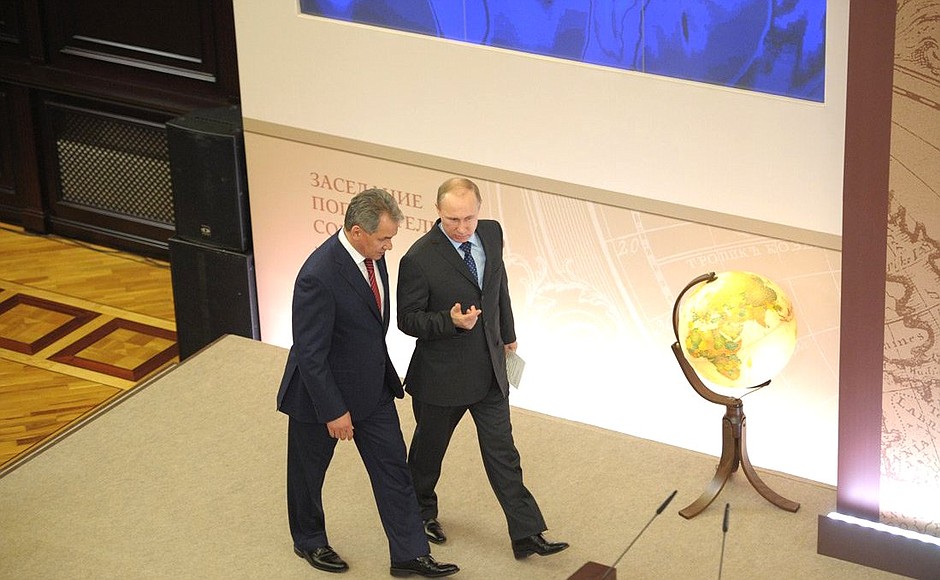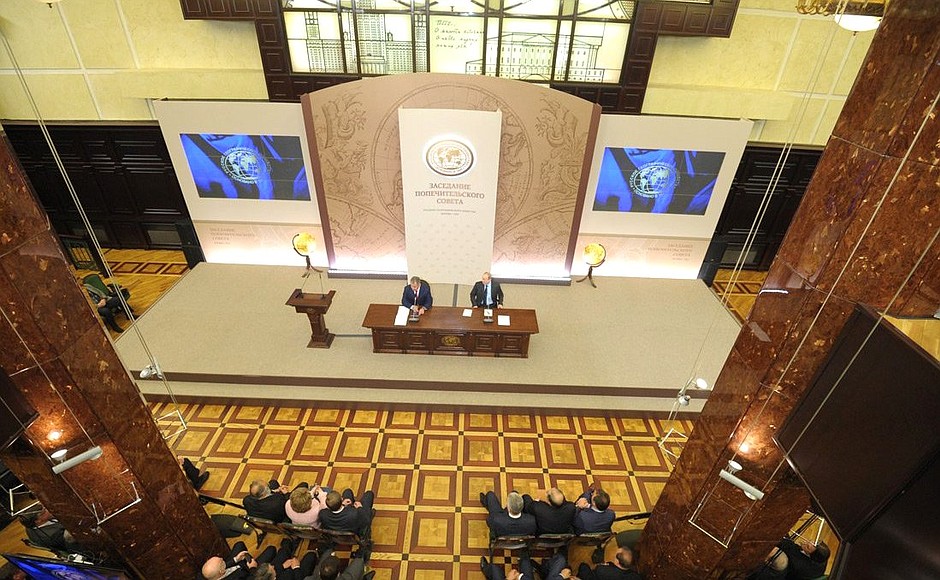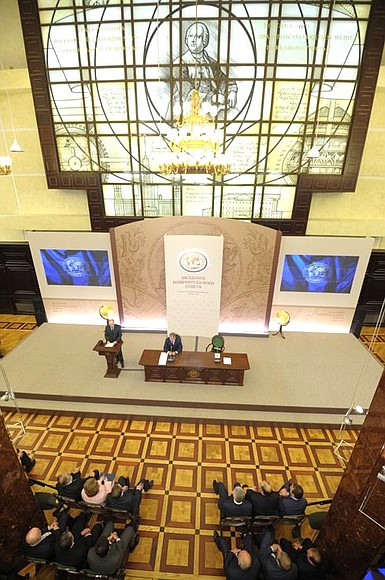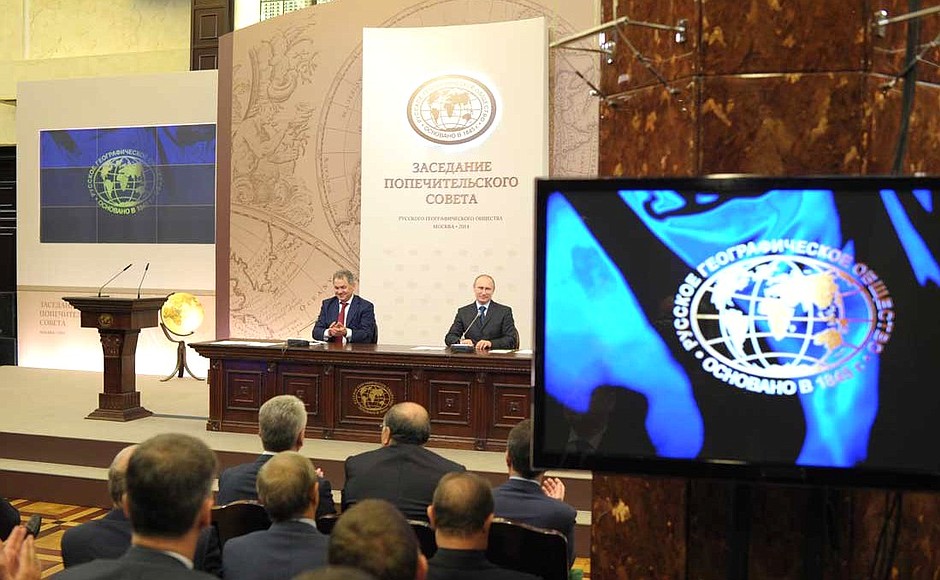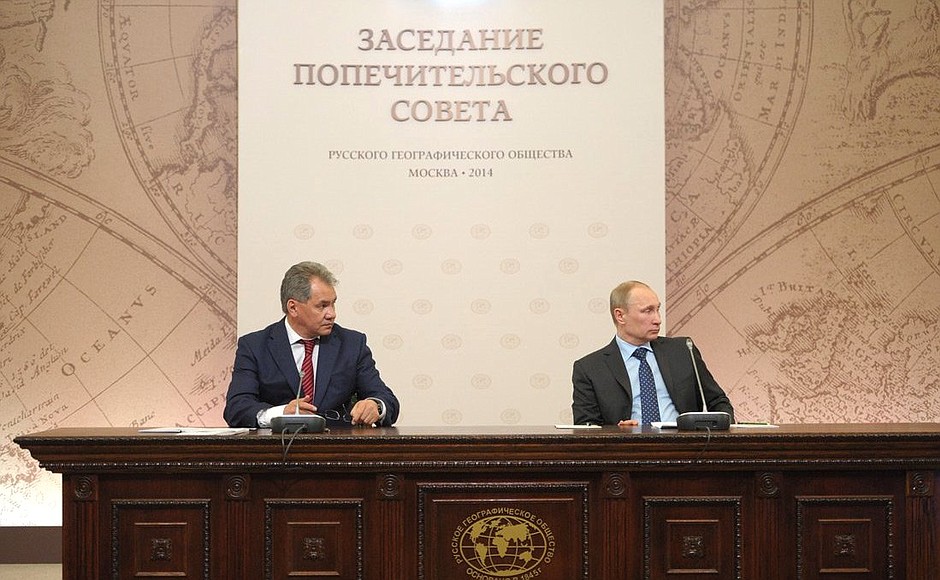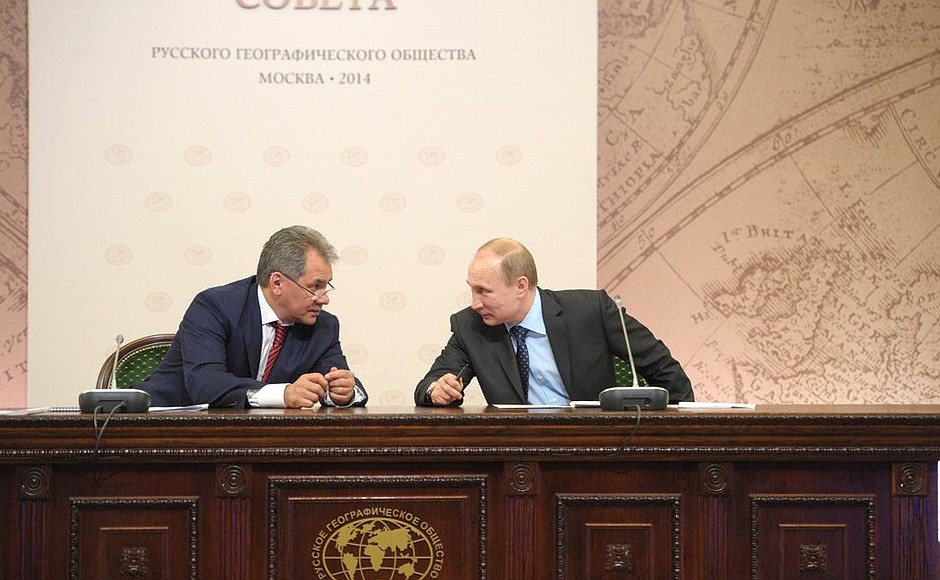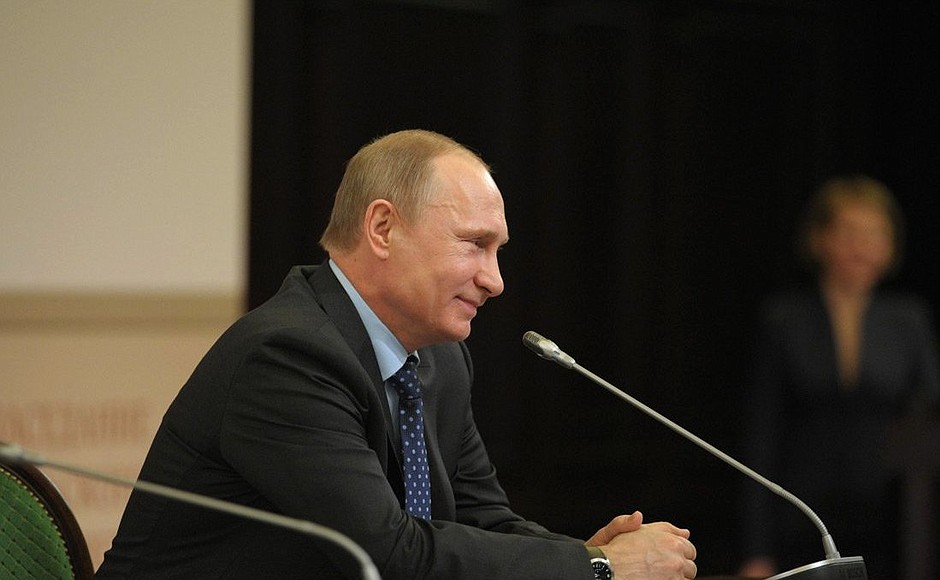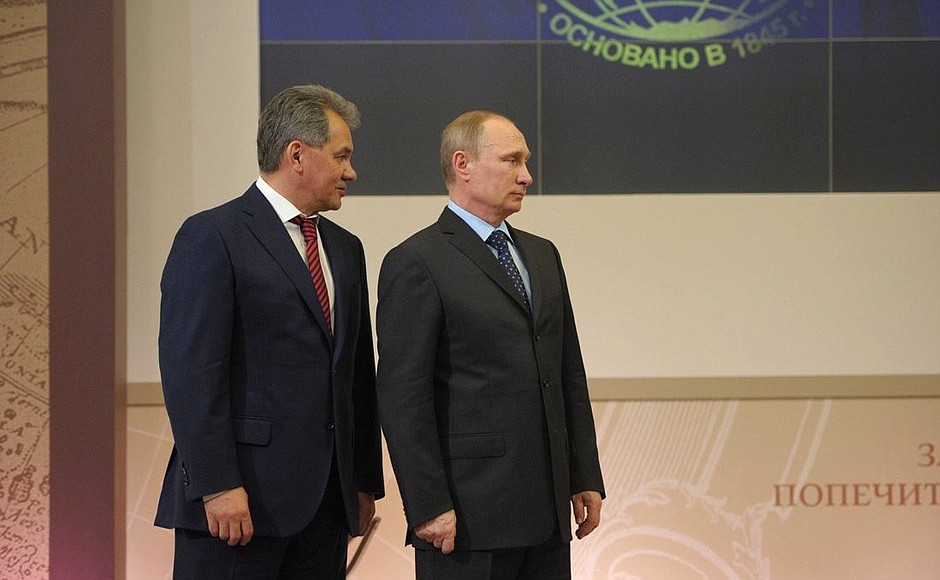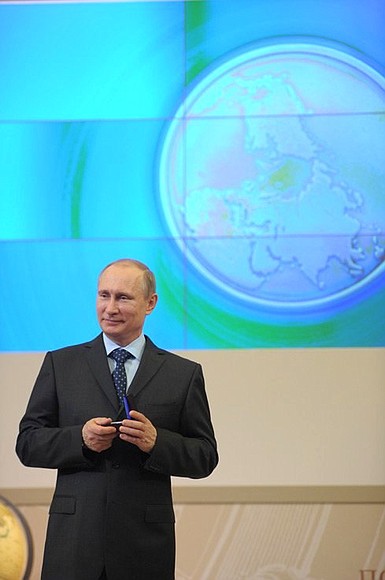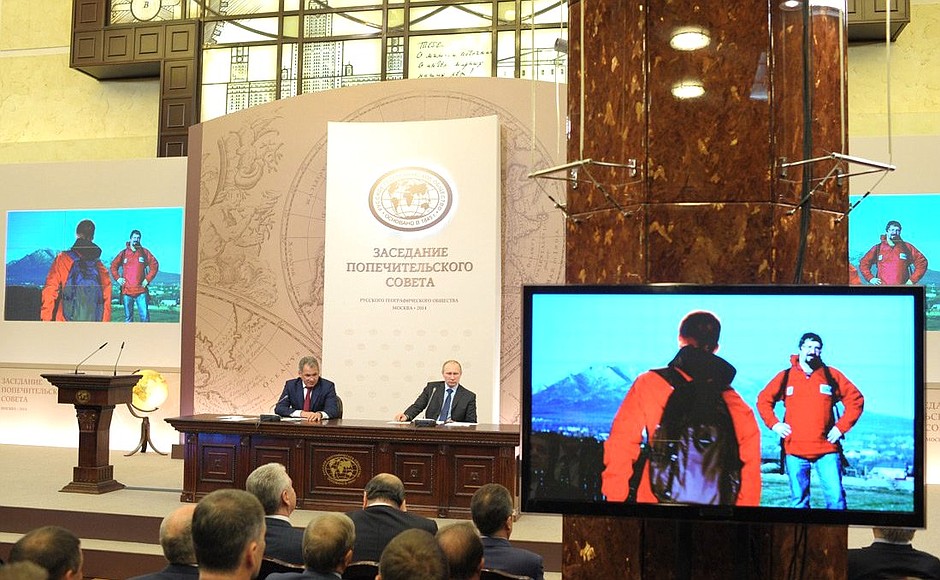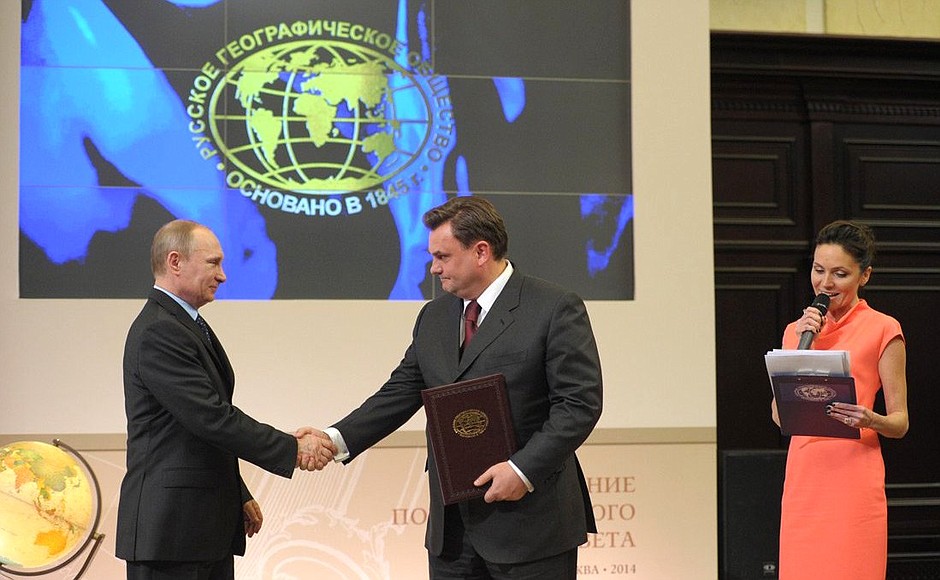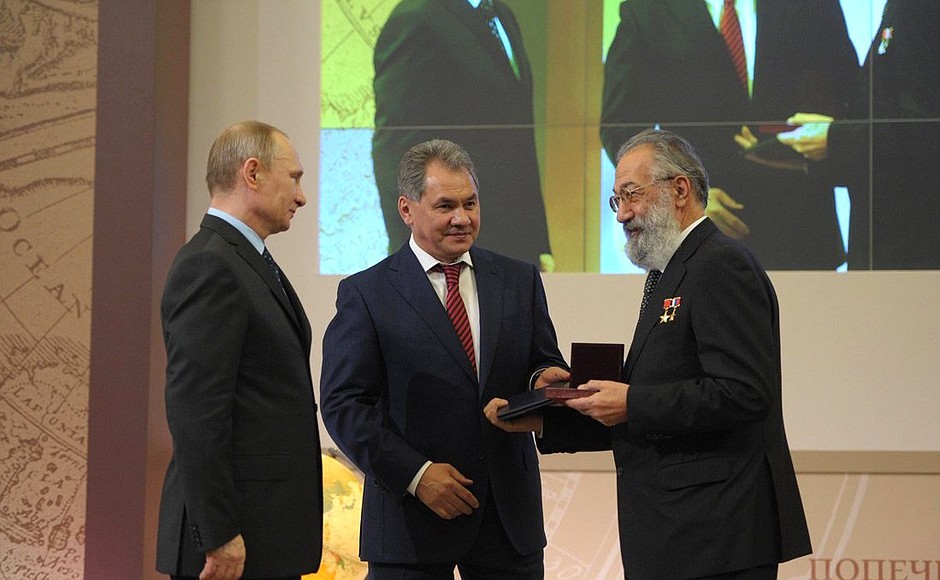The meeting participants discussed the Society’s activities in 2013 and plans and development prospects for the future.
During the meeting, certificates were issued to new members of the RGS Board of Trustees: Supervisory Board Chairman of the Centre for the Study and Conservation of the Amur Tiger, Presidential Aide and Head of the Presidential Control Directorate Konstantin Chuychenko, NOVATEK Chairman Leonid Mikhelson and CEO of the Tuva Energy Industrial Corporation Ruslan Baisarov.
Russian Geographical Society medals were also awarded at the meeting.
The Grand Gold Medal was awarded to the head of the evolutionary geography laboratory at the Geography Institute of the Russian Academy of Sciences Professor Andrei Velichko for his outstanding contribution to the development of national geography, and to the President of the Russian Polar Explorers’ Association, First Vice President of the Russian Geographical Society Artur Chilingarov for his outstanding contribution to the exploration of the Arctic and Antarctic.
A Silver Medal was awarded to RGS Board of Trustees member Frederik Dag Arfst Paulsen for his active participation in expeditions and contribution to the development of the RGS.
The meeting also witnessed the presentation of a new digital channel IQ HD, which will, among other things, show in high definition the best educational films to be made with the assistance of the Russian Geographical Society.
At the meeting of the RGS Board of Trustees Vladimir Putin issued grant certificates for the implementation of such projects as Onega Area Shipbuilders (organisation of an expedition and a festival of shipbuilding and navigation clubs for children and young people); 2013 Catastrophic Flood in the Amur River Basin: Consequences; Initial Population of the Arctic by Man in Conditions of a Changing Natural Environment; Medium-size Cities in the Population System of Central Russia; a project to study and preserve the European bison in Central Russia and the organisation of the Russian-Kazakh ecological and geographical expedition along the Chagan River. Media grants were also awarded for the creation of a series of films Great Rivers of Russia, the film Live Ladoga and the photo project Wildlife of the Putorana Plateau and the Taimyr Peninsula.
* * *
President of Russia Vladimir Putin: Good afternoon, colleagues.
I am very happy to greet you all – participants in the annual meeting of the Russian Geographical Society Board of Trustees.
Today we will assess the practical outcome of the projects implemented with the support of the Russian Geographical Society last year and look at the most promising applications for grants.
I would like to note here that many initiatives of the Society that began as short-term, one or two-year projects have expanded in scope to include new directions and new participants. This goes to show how broad and multifaceted the agenda of the Russian Geographical Society is, how closely it is linked to the life of the country and its regions and what a significant educational and humanitarian role the Society’s projects play.
Take, for instance, its wildlife protection programmes. They produced not only unique data and recommendations on the conservation of rare animals, but a whole range of important decisions, including those on the expansion of nature conservation areas and the toughening of environmental legislation. We now have new nature reserves: the Buzuluk Pine Forest, Pozarym and Leopards’ Land. As for legislation, now the killing of certain animals may be treated as a criminal offence.
In addition, a centre of the Amur Leopard has been set up, thanks to which the population of this rare animal is already growing. In fact, it has doubled. The absolute figures are not that significant yet, but the total number has doubled. Later the Amur Tiger centre was set up, which was a major step to revive the tiger in the wild in Russia.
Equally significant results are produced every year by such complex projects as Kyzyl-Kuragino, Fukushima and Novosibirsk Islands. Many of you know that all of this has to do with human activity in one way or another. Thus, Kyzyl-Kuragino focuses on a large project to develop coalfields and road construction. It is very important to make sure that while implementing these projects we do not lose anything we hold dear in history or nature. Fukushima, obviously, has to do with the tragedy at the power station; it was essential to launch regular monitoring of the environment.
It is important that many initiatives aimed primarily at the younger generation find a great response. Take, for instance, the expedition to Gogland Island launched in 2013. Now complex research will extend to neighbouring islands in the Gulf of Finland.
Not only are the goals expanding, but the range of participants as well. Students from the Geography Department at the Taurida National Vernadsky University are to visit Leningrad Region. Maybe you could invite students from Finland as well. You should talk to them, I am sure they would find it interesting.
We are only just setting up Crimean branches of the RGS in Simferopol and Sevastopol, while young people who are part of this movement can already take part in projects launched in other parts of the Russian Federation.
I believe one of last year’s main achievements was the launch of the Russian Geographical Society’s youth section, called RGS Trailblazers. Thousands of Russian high school students have already joined it. I would also like to single out the launch of the publication Great Russian Travellers. In the course of three years, children’s libraries, cadet schools, and Nakhimov naval academies and Suvorov military academies across the country will receive 90,000 books. I am certain that this project, dedicated to the memory and courage of travellers and explorers will continue, just like the Geography Class television series. It has become very popular and is one of the best educational programmes, of which we still do not have enough.
I am convinced that educational media and publishing projects conducted by the RGS should be actively used by the national education system as unique and informative support material not only for teaching geography, but also in such subjects as sociology, history, culture, economics and literature. I am also referring here to the data stored in the Society’s invaluable archives and library, which are gradually being digitalised and made available to the public on a special website.
One of the instruments for promoting the positive RGS initiatives is the cooperation agreement that the Society enters into with other associations, various regions and federal agencies. As far as I know, today we expect a similar document to be signed with the Ministry of Natural Resources. I would like to welcome our colleagues to our community.
We should be more active in attracting new supporters, initiating cooperation and joining programmes of other associations that are close in spirit and objectives, like, for instance, the History or Military History societies. Besides, we must offer our esteemed trustees more opportunities to take practical part in the work of the RGS, so that you do not limit your activity to the support of grants (something we would like to thank you for, because, frankly speaking, without your funding all this would have been impossible; all these projects are implemented through your direct involvement). Maybe we could expand your participation – I refer here not to your financial participation, but to your personal involvement in consulting and organisational activities, or simply personal participation in and assistance to specific programmes that many of those present find interesting. This is of special importance to the RGS branches that operate in all regions of the Russian Federation. Your companies’ offices in this or that region could take the Society’s branches in the given regions under their patronage. I would like you to consider this possibility.
Of great value for us are also projects that have a serious scientific potential, as well as those that unite people of all ages by involving them in exciting and interesting initiatives that help people to get to know their country better, teach them to understand and value its unique natural and cultural diversity and history. This is what the Russian Geographical Society was set up for. I would like once again to thank those who help it to carry on with honour its educational traditions, all members of the Board of Trustees and the Media Council.
Let us begin our work.
<…>
